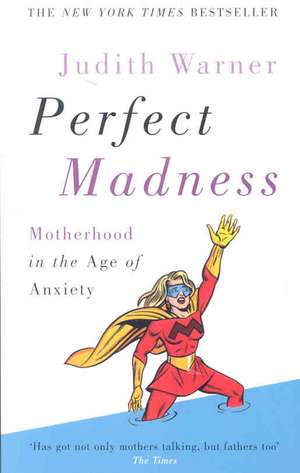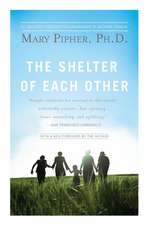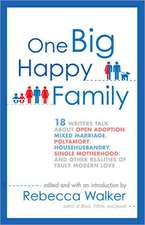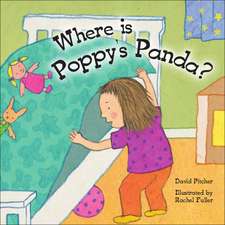Perfect Madness
Autor Judith Warneren Limba Engleză Paperback – mar 2006
| Toate formatele și edițiile | Preț | Express |
|---|---|---|
| Paperback (2) | 101.75 lei 6-8 săpt. | |
| Riverhead Books – 31 ian 2006 | 138.53 lei 3-5 săpt. | |
| Ebury Publishing – mar 2006 | 101.75 lei 6-8 săpt. |
Preț: 101.75 lei
Nou
Puncte Express: 153
Preț estimativ în valută:
19.47€ • 21.14$ • 16.36£
19.47€ • 21.14$ • 16.36£
Carte tipărită la comandă
Livrare economică 22 aprilie-06 mai
Preluare comenzi: 021 569.72.76
Specificații
ISBN-13: 9780091907167
ISBN-10: 0091907160
Pagini: 336
Dimensiuni: 135 x 215 x 25 mm
Greutate: 0.36 kg
Editura: Ebury Publishing
Locul publicării:United Kingdom
ISBN-10: 0091907160
Pagini: 336
Dimensiuni: 135 x 215 x 25 mm
Greutate: 0.36 kg
Editura: Ebury Publishing
Locul publicării:United Kingdom
Cuprins
Part I: The Mommy Mystique
Preface: "This Mess"
1. Introduction: The Mommy Mystique
2. The New Problem That Has No Name
Part II: The Motherhood Religion
3. The Sacrificial Mother
4. Selfish Mothers, Forsaken Children
5. Millennial Motherhood
6. The Motherhood Religion
Part III: Ourselves, As Mothers
7. A Generation of Control Freaks
8. Running Scared
9. Winner-Take-All Parenting
10. Wonderful Husbands
11. For a Politics of Quality of Life
12. Conclusion
Acknowledgments
Bibliography
Index
Preface: "This Mess"
1. Introduction: The Mommy Mystique
2. The New Problem That Has No Name
Part II: The Motherhood Religion
3. The Sacrificial Mother
4. Selfish Mothers, Forsaken Children
5. Millennial Motherhood
6. The Motherhood Religion
Part III: Ourselves, As Mothers
7. A Generation of Control Freaks
8. Running Scared
9. Winner-Take-All Parenting
10. Wonderful Husbands
11. For a Politics of Quality of Life
12. Conclusion
Acknowledgments
Bibliography
Index
Recenzii
"Manifestoes blast their way into the popular consciousness on two kinds of fuel: recognition (we see ourselves in them) and rage (we can no longer tolerate the injustice they describe). Judith Warner's 'Perfect Madness' brims with both." —The New York Times Book Review
"How did we become a nation of worry-wart, control-freak mothers? Warner does a superb job of succinctly tracing the societal evolution and parenting theories from the postwar, Dr. Spock '50s and '60s through the past three decades since the dawn of feminism...[Perfect Madness] is sure to stir controversy and emotions." —San Francisco Chronicle
"Perfect Madness has struck a chord among middle-class moms guilt-tripped into being time-martyrs and trying to micromanage their children’s lives." —People
"[Perfect Madness] has struck a chord with moms across the country, who believe they're going crazy." —Dallas Morning News
"In the end [Warner] arrives at the controversial conclusion that mothers are not victims of outside forces but rather their own worst enemies. The bigger issue, Ms. Warner argues, is that whether working or not, moms are consumed by what she sees as a new 'soul-draining' perfectionism that's turned parenting—from the first ultrasound to the last college application—into a competitive sport. Ms. Warner's observations inject new life into what has become a long, tired debate." —New York Observer
"In this polemic about contemporary motherhood, Warner argues that the gains of feminism are no match for the frenzied perfectionism of American parenting. In the absence of any meaningful health, child-care, or educational provisions, martyrdom appears to be the only feasible model for successful maternity—with destructive consequences for both mothers and children. Comparing this situation with her experiences of child-rearing in France, Warner finds American 'hyper-parenting'—pre-school violin and Ritalin on demand—'just plain crazy.' The trouble is a culture that, though it places enormous private value on children, neglects them in the arenas of public policy. She is concerned less with sexual politics than with the more persuasive effects of the 'winner take all' mentality, and makes an urgent case for more socially integrated parenthood." —New Yorker
"Modern motherhood is exacting costs . . . With Perfect Madness, Warner convincingly shows the psychological damages." —Washington Post Book World
"[Perfect Madness] has struck a chord among middle-class moms guilt-tripped into being time-martyrs and trying to micromanage their children's lives." —People
"A sharply observed study of motherhood in today's culture." —Atlanta Journal-Constitution
"Warner argues for a saner society, where everyone would have access to a decent living and enough family time for themselves and their children." —Publishers Weekly
"[Judith Warner's] words have struck a nerve with modern mothers." —Richmond Times Dispatch
"Warner has…inspired the beginnings of debate about where neurotic motherhood leads." —London Observer
"Perfect Madness is the utter madness of life in a frenzy around the children. But it also hints at the madness that is inherent in women's attempts to be 'perfect mothers' and have 'perfect' children. As a result they give up everything that distinguished them as individual women—with a variety of wishes, desires, and interests—before they became mothers." —Ha'Aretz
"How did we become a nation of worry-wart, control-freak mothers? Warner does a superb job of succinctly tracing the societal evolution and parenting theories from the postwar, Dr. Spock '50s and '60s through the past three decades since the dawn of feminism...[Perfect Madness] is sure to stir controversy and emotions." —San Francisco Chronicle
"Perfect Madness has struck a chord among middle-class moms guilt-tripped into being time-martyrs and trying to micromanage their children’s lives." —People
"[Perfect Madness] has struck a chord with moms across the country, who believe they're going crazy." —Dallas Morning News
"In the end [Warner] arrives at the controversial conclusion that mothers are not victims of outside forces but rather their own worst enemies. The bigger issue, Ms. Warner argues, is that whether working or not, moms are consumed by what she sees as a new 'soul-draining' perfectionism that's turned parenting—from the first ultrasound to the last college application—into a competitive sport. Ms. Warner's observations inject new life into what has become a long, tired debate." —New York Observer
"In this polemic about contemporary motherhood, Warner argues that the gains of feminism are no match for the frenzied perfectionism of American parenting. In the absence of any meaningful health, child-care, or educational provisions, martyrdom appears to be the only feasible model for successful maternity—with destructive consequences for both mothers and children. Comparing this situation with her experiences of child-rearing in France, Warner finds American 'hyper-parenting'—pre-school violin and Ritalin on demand—'just plain crazy.' The trouble is a culture that, though it places enormous private value on children, neglects them in the arenas of public policy. She is concerned less with sexual politics than with the more persuasive effects of the 'winner take all' mentality, and makes an urgent case for more socially integrated parenthood." —New Yorker
"Modern motherhood is exacting costs . . . With Perfect Madness, Warner convincingly shows the psychological damages." —Washington Post Book World
"[Perfect Madness] has struck a chord among middle-class moms guilt-tripped into being time-martyrs and trying to micromanage their children's lives." —People
"A sharply observed study of motherhood in today's culture." —Atlanta Journal-Constitution
"Warner argues for a saner society, where everyone would have access to a decent living and enough family time for themselves and their children." —Publishers Weekly
"[Judith Warner's] words have struck a nerve with modern mothers." —Richmond Times Dispatch
"Warner has…inspired the beginnings of debate about where neurotic motherhood leads." —London Observer
"Perfect Madness is the utter madness of life in a frenzy around the children. But it also hints at the madness that is inherent in women's attempts to be 'perfect mothers' and have 'perfect' children. As a result they give up everything that distinguished them as individual women—with a variety of wishes, desires, and interests—before they became mothers." —Ha'Aretz
Notă biografică
Judith Warner is the author of the New York Times bestselling Perfect Madness: Motherhood in the Age of Anxiety and Hillary Clinton: The Inside Story, as well as several other books. She writes the Domestic Disturbances column for the New York Times website and is a former special correspondent for Newsweek in Paris. She lives in Washington, D.C., with her husband and their children.
Extras
From the Preface
“This Mess”
This is a very personal book.
It is a snapshot of motherhood - of parenthood, really - as I found it in Washington, D.C., and its suburbs from the fall of 2000 to the summer of 2004. And although in writing it I made every effort to take my research further--away from the big cities of the East Coast, back in time to the colonial roots of America's cultural history, then forward again to our day--I know that what I have written here is not an encyclopedic overview of Motherhood, Now and Forever.
It's not a scholarly history.
Neither is it a book of self-help.
It's not a book about the work-family conflict.
Nor is it about "balance," or the problems of working mothers, or the virtues of stay-at-home motherhood.
It does not contain much by way of policy.
It will not tell you how to raise your children.
It is, rather, an exploration of a feeling. That caught-by-the-throat feeling so many mothers have today of always doing something wrong.
And it's about a conviction I have that this feeling--this widespread, choking cocktail of guilt and anxiety and resentment and regret--is poisioning motherhood for American women today. Lowering our horizons and limiting our minds. Sapping energy that we should have for ourselves and our children. And drowning out thoughts that might lead us, collectively, to formulate solutions.
The feeling has many faces but it doesn't really have a name. It's not depression. It's not oppression. It's a mix of things, a kind of too-muchness. An existential discomfort. A "mess," as one woman I interviewed called it, for lack of a better word.
She wasn't a woman who normally lacked for words. She was a newspaper editor. A headline writer. A professional wordsmith. And yet, as she sat with me one night, half-buried in a sofa in a circle of moms, she struggled, and stumbled, as she tried to express what it was that made her life feel like it was always about to come apart.
None of it made much sense, really, she said. She was a person lucky enough to have many choices. In the hope of finding "balance" she'd chosen to scale down her career--working part-time and at night, in order to spend as much time as possible with her nine-year-old daughter.
This is the kind of arrangement that mothers are supposed to dream of. This mom knew she ought to feel blessed. But somehow, nothing had worked out as planned. Working nights meant that she was tired all the time, and cranky, and stressed. And forever annoyed with her husband. And now--her daughter was after her to get a day job. It seemed she was finding that having Mom around most of the time wasn't all it was cracked up to be, particularly if Mom was forever on the edge. So what was she to do?
The woman waved her hands in circles, helplessly. "What I'm trying to figure out--" She paused. "What I'm trying to remember…;is how I ended up raising this princess…;how I got into…;how to get out of…;this, this, this…;this mess."
This mess.
The words crackled like lightning in the suburban living room where we'd been sitting since sunset. It was a Tuesday evening in the winter of 2002, the bath-into-bed-time hour was past, and the moms, out for a night without kids, were exhausted. The conversation had been moving laboriously, the big issue, Motherhood, lurching heavily across the coffee table like a big medicine ball full of angst.
Like the newspaper editor, the other moms didn't feel entitled to complain. By any objective measure, they had easy lives--kids in good schools, houses in good neighborhoods, dependable husbands whose incomes allowed them to mostly choose what they wanted to do with their time. Most had chosen to pursue Mommy Track jobs--part-time work, a big cut in ambition and salary. But they didn't mind that; they knew that that was a privilege. Still, there was something that bugged them. It ate away at them. It cast a pall on all the rest. What they couldn't make peace with was the feeling that somehow, more globally, they were living Mommy Track lives.
Lives filled with knee pads and bake sales and dentist's appointments and car seats. Lives somehow lesser than those of their full-time working husbands--men who managed, when the kids ran wild in the morning, spilling their Cheerios, and losing their shoes, to lose themselves in the newspaper, fading "into black and white" at the breakfast table, as one mom put it to me, "just like Father Knows Best."
The moms' lives were punctuated by boxer shorts on the floor and quilt-making at school, carpooling and play dates and mother-daughter book clubs, and getting in to see the right dentist and worrying about whether they had the wrong pediatrician, and, and, and, layer after layer of trivia and absurdity that sometimes made them feel like they were going out of their heads.
Sometimes, a rage seized them that was hard to control. Sometimes, everything just seemed out of control. "Living in past, present, and future all at one time," one mom said, "I get overwhelmed. I get worried about things falling apart."
Every three months, they would blow. Every now and then, their husbands and children knew, they had to leave Mommy alone. It was a standard part of their family lives. The "Zen of the boxer shorts," as one mother called it, could only last for so long.
And the real problem was--the worst of it all was--it wasn't altogether clear that what they were doing with their lives was actually worthwhile. The choices and the compromises--when all was said and done, they didn't seem to add up to all that much. Not to a great sense of achievement. Not to a great sense of pride. There was no gratitude from their families, certainly. Their husbands had started taking a tone. It sounded like: "This is what I want you to do…;" Their children simply wondered what they did with their time.
Their children had almost all of them, and they just wanted more, more, more. And after years of always trying to give more, give their all, they were coming to realize that more wasn't necessarily right. But what to do, then?
"The children are the center of the household and everything goes around them," said a woman who'd left a prestigious government job working on child-care policy because it allowed her no time with her kids. "You want to do everything and be everything for them because this is your job now. You take all the energy and enthusiasm you had in your career and you feel the need to be as successful raising your children as you were in the workplace. And you can make your kids totally crazy in the process."
"And," another stay-at-home mom put in, "the reality is: at the end of the day, you could put your heart in it and it could be all cocked up. For nothing wrong that you did. Your kids could wind up a mess, and there's your life's work."
There was a problem floating in the room, a problem so big and so strange that the women couldn't quite name it. It wasn't exactly guilt. It wasn't exactly stress. It wasn't exactly anger. It was all of that and more.
"…;This mess."
Those two simple words were like a code-breaker. Everything became clear then, and suddenly, the sentences flew.
"It's like they keep a tally of the did-nots."
"I am absolutely and scarily consumed by rage."
"I want my kids to think of me not just as doing for them but also as fun."
"I think we're making ourselves crazy."
"Your kids can end up completely messed up."
"Are we neurotic, insecure? What got us to here?"
I couldn't answer those questions back then. I didn't even try. The fact is: I was put off that night by those smartest-of-the-smart, well-off, and powerful women, with their Washington insider lives.
All women should have problems like yours, I found myself thinking. We all should be so lucky.
It was only later, when I stepped back, transcribed the conversation, and read--and read and read--more transcripts and articles and e-mails and books and policy papers, when I stepped back and listened to the cultural conversation on motherhood going on in my home and in theirs and, I believe, in all of ours, that I came to see that, indeed, most women did. Have problems like theirs. In varying forms. And in varying degress, depending on how much money and how much luck and how many real choices they had. I came to believe that all mothers in America, in differing ways and to different degrees, were caught up in The Mess. And that's because the climate in which we now mother is, in many ways, just plain crazy.
It's not the "fault" of the media. Or the Christian Right. Or George W. Bush. Or Phyllis Schlafly. Or Dr. Laura Schlessinger. Or Mrs. Doubtfire. It's us--this generation of mothers. And it's the way our culture has groomed and greeted us. Mixing promise with politics, feminism with "family values," science and sound bites and religion and, above all, fear into a combustible combination that is nothing less than perfect madness
“This Mess”
This is a very personal book.
It is a snapshot of motherhood - of parenthood, really - as I found it in Washington, D.C., and its suburbs from the fall of 2000 to the summer of 2004. And although in writing it I made every effort to take my research further--away from the big cities of the East Coast, back in time to the colonial roots of America's cultural history, then forward again to our day--I know that what I have written here is not an encyclopedic overview of Motherhood, Now and Forever.
It's not a scholarly history.
Neither is it a book of self-help.
It's not a book about the work-family conflict.
Nor is it about "balance," or the problems of working mothers, or the virtues of stay-at-home motherhood.
It does not contain much by way of policy.
It will not tell you how to raise your children.
It is, rather, an exploration of a feeling. That caught-by-the-throat feeling so many mothers have today of always doing something wrong.
And it's about a conviction I have that this feeling--this widespread, choking cocktail of guilt and anxiety and resentment and regret--is poisioning motherhood for American women today. Lowering our horizons and limiting our minds. Sapping energy that we should have for ourselves and our children. And drowning out thoughts that might lead us, collectively, to formulate solutions.
The feeling has many faces but it doesn't really have a name. It's not depression. It's not oppression. It's a mix of things, a kind of too-muchness. An existential discomfort. A "mess," as one woman I interviewed called it, for lack of a better word.
She wasn't a woman who normally lacked for words. She was a newspaper editor. A headline writer. A professional wordsmith. And yet, as she sat with me one night, half-buried in a sofa in a circle of moms, she struggled, and stumbled, as she tried to express what it was that made her life feel like it was always about to come apart.
None of it made much sense, really, she said. She was a person lucky enough to have many choices. In the hope of finding "balance" she'd chosen to scale down her career--working part-time and at night, in order to spend as much time as possible with her nine-year-old daughter.
This is the kind of arrangement that mothers are supposed to dream of. This mom knew she ought to feel blessed. But somehow, nothing had worked out as planned. Working nights meant that she was tired all the time, and cranky, and stressed. And forever annoyed with her husband. And now--her daughter was after her to get a day job. It seemed she was finding that having Mom around most of the time wasn't all it was cracked up to be, particularly if Mom was forever on the edge. So what was she to do?
The woman waved her hands in circles, helplessly. "What I'm trying to figure out--" She paused. "What I'm trying to remember…;is how I ended up raising this princess…;how I got into…;how to get out of…;this, this, this…;this mess."
This mess.
The words crackled like lightning in the suburban living room where we'd been sitting since sunset. It was a Tuesday evening in the winter of 2002, the bath-into-bed-time hour was past, and the moms, out for a night without kids, were exhausted. The conversation had been moving laboriously, the big issue, Motherhood, lurching heavily across the coffee table like a big medicine ball full of angst.
Like the newspaper editor, the other moms didn't feel entitled to complain. By any objective measure, they had easy lives--kids in good schools, houses in good neighborhoods, dependable husbands whose incomes allowed them to mostly choose what they wanted to do with their time. Most had chosen to pursue Mommy Track jobs--part-time work, a big cut in ambition and salary. But they didn't mind that; they knew that that was a privilege. Still, there was something that bugged them. It ate away at them. It cast a pall on all the rest. What they couldn't make peace with was the feeling that somehow, more globally, they were living Mommy Track lives.
Lives filled with knee pads and bake sales and dentist's appointments and car seats. Lives somehow lesser than those of their full-time working husbands--men who managed, when the kids ran wild in the morning, spilling their Cheerios, and losing their shoes, to lose themselves in the newspaper, fading "into black and white" at the breakfast table, as one mom put it to me, "just like Father Knows Best."
The moms' lives were punctuated by boxer shorts on the floor and quilt-making at school, carpooling and play dates and mother-daughter book clubs, and getting in to see the right dentist and worrying about whether they had the wrong pediatrician, and, and, and, layer after layer of trivia and absurdity that sometimes made them feel like they were going out of their heads.
Sometimes, a rage seized them that was hard to control. Sometimes, everything just seemed out of control. "Living in past, present, and future all at one time," one mom said, "I get overwhelmed. I get worried about things falling apart."
Every three months, they would blow. Every now and then, their husbands and children knew, they had to leave Mommy alone. It was a standard part of their family lives. The "Zen of the boxer shorts," as one mother called it, could only last for so long.
And the real problem was--the worst of it all was--it wasn't altogether clear that what they were doing with their lives was actually worthwhile. The choices and the compromises--when all was said and done, they didn't seem to add up to all that much. Not to a great sense of achievement. Not to a great sense of pride. There was no gratitude from their families, certainly. Their husbands had started taking a tone. It sounded like: "This is what I want you to do…;" Their children simply wondered what they did with their time.
Their children had almost all of them, and they just wanted more, more, more. And after years of always trying to give more, give their all, they were coming to realize that more wasn't necessarily right. But what to do, then?
"The children are the center of the household and everything goes around them," said a woman who'd left a prestigious government job working on child-care policy because it allowed her no time with her kids. "You want to do everything and be everything for them because this is your job now. You take all the energy and enthusiasm you had in your career and you feel the need to be as successful raising your children as you were in the workplace. And you can make your kids totally crazy in the process."
"And," another stay-at-home mom put in, "the reality is: at the end of the day, you could put your heart in it and it could be all cocked up. For nothing wrong that you did. Your kids could wind up a mess, and there's your life's work."
There was a problem floating in the room, a problem so big and so strange that the women couldn't quite name it. It wasn't exactly guilt. It wasn't exactly stress. It wasn't exactly anger. It was all of that and more.
"…;This mess."
Those two simple words were like a code-breaker. Everything became clear then, and suddenly, the sentences flew.
"It's like they keep a tally of the did-nots."
"I am absolutely and scarily consumed by rage."
"I want my kids to think of me not just as doing for them but also as fun."
"I think we're making ourselves crazy."
"Your kids can end up completely messed up."
"Are we neurotic, insecure? What got us to here?"
I couldn't answer those questions back then. I didn't even try. The fact is: I was put off that night by those smartest-of-the-smart, well-off, and powerful women, with their Washington insider lives.
All women should have problems like yours, I found myself thinking. We all should be so lucky.
It was only later, when I stepped back, transcribed the conversation, and read--and read and read--more transcripts and articles and e-mails and books and policy papers, when I stepped back and listened to the cultural conversation on motherhood going on in my home and in theirs and, I believe, in all of ours, that I came to see that, indeed, most women did. Have problems like theirs. In varying forms. And in varying degress, depending on how much money and how much luck and how many real choices they had. I came to believe that all mothers in America, in differing ways and to different degrees, were caught up in The Mess. And that's because the climate in which we now mother is, in many ways, just plain crazy.
It's not the "fault" of the media. Or the Christian Right. Or George W. Bush. Or Phyllis Schlafly. Or Dr. Laura Schlessinger. Or Mrs. Doubtfire. It's us--this generation of mothers. And it's the way our culture has groomed and greeted us. Mixing promise with politics, feminism with "family values," science and sound bites and religion and, above all, fear into a combustible combination that is nothing less than perfect madness
















